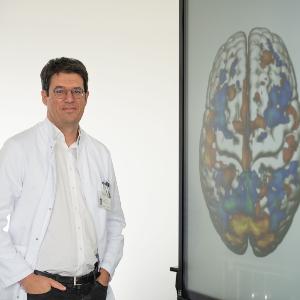Artificial intelligence in medicine: Short-lived hype or the start of a new era?
25 Oct 2021
LMU medical professor Nikolaos Koutsouleris explains how AI can improve healthcare and what challenges remain to be resolved.
25 Oct 2021
LMU medical professor Nikolaos Koutsouleris explains how AI can improve healthcare and what challenges remain to be resolved.

The development of machine learning has changed the face of medical research in recent years. New AI-based analytics give us an increasingly better grasp of the complexity of genetic predisposition, social environmental factors and biological disease processes. At the same time, AI technology is acting as a catalyst for translating research into clinical application.
In his lecture as part of the new AI Lectures series at LMU, Professor Nikolaos Koutsouleris explains how medical Big Data can be used to predict and prevent severe disease progression and enable individualized therapies to be planned. In many cases it is proving difficult to implement such tools owing to barriers around methodology and infrastructure, coupled with high regulatory and ethical requirements. Koutsouleris will therefore discuss what answers AI-based personalized medicine must find to these challenges.
Professor Nikolaos Koutsouleris: “Artificial intelligence in medicine: Short-lived hype or the start of a new era?” (The lecture is held in German),
Tuesday, 2 November 2021,
6:15-7:45 p.m.
Registration
More information on the AI Lectures here:
Contact: ringvorlesung-lmu@lmu.de

explains in his AI lecture how AI can improve healthcare and what challenges remain to be resolved | © LMU
You are working on preventing mental illness through the use of AI. How does that work exactly?
Nikolaos Koutsouleris: Young people who are suffering from mental health complaints, such as depression, difficulty concentrating, disorganized thinking or psychological impairments, contact our outpatient clinic dedicated to early disease detection. We make an initial risk classification based on internationally established criteria. If a person meets these risk criteria and gives their consent, we collect further data on their history, behavior and symptoms, perform an MRI scan on their brain and take blood samples for genetic and proteomic testing. We then bring the individuals in for ongoing examinations to monitor how their mental health develops going forward. These follow-up exams allow us to determine if some of the individuals develop severe mental illness or if the risk symptoms resolve over time. The data collected is fed into an AI algorithm that learns prognostic patterns allowing for case-by-case prediction of disease progression with some sensitivity and specificity. These AI models are cross-validated and tested using comparable but independent samples. If the models pass these tests, they can then be validated in clinical trials. Eventually this leads on to the models being certified and used in clinical practice.
Around the world, the use of new AI-based analytics tools has made it easier to predict disease trajectories and treatment methods. What does this mean for people’s future healthcare?
In the medium to long term, the focus of psychiatric care will shift towards a preventive approach. That is because the implementation of well-validated and ethically acceptable AI algorithms in clinical practice will make psychiatric or psychological expertise available to GPs and primary care physicians. This means that a larger number of at-risk individuals could be identified more effectively, earlier and much more accurately than before. These at-risk patients could then be offered personalized and preventive measures. The hope is that this will reduce the amount of patients who will go on to develop a chronic condition, thereby considerably reducing the direct and indirect costs of these illnesses. This can in turn free up resources to invest in extending the preventive approach to broader swaths of the population. What will both enable and simultaneously drive this development is the improved and more in-depth digitalization of health data and the interconnectivity of all players in the healthcare system.
In using artificial intelligence, the medical field has to meet many requirements of a methodological, regulatory and ethical nature. What needs to happen for the hype around AI to become reality?
First, there need to be much larger data sets to train the AI as well as data sets or platforms for external validation of AI-based models. Second, transparent or trustworthy AI is needed to strengthen participatory, objective and therapeutically relevant decisions. Third, bias analyses to detect systematic errors in AI models are required to mitigate the risk of discriminating and inequitable healthcare. Fourth, a comparative approach should be implemented that tests the “predictive behavior” of AI models in different health contexts to specify clear application guidelines or windows. Fifth, clinical demonstrators should test and compare AI models in real-world contexts, especially in terms of their impact on clinical and participatory decision-making processes. Finally, effective data protection strategies are needed to ensure that patient data cannot be misused for analysis by AI.
Professor Nikolaos Koutsouleris is Professor of Precision Psychiatry at LMU Munich and King’s College London and practices as a specialist in Psychiatry and Psychotherapy at the University of Munich Hospital.